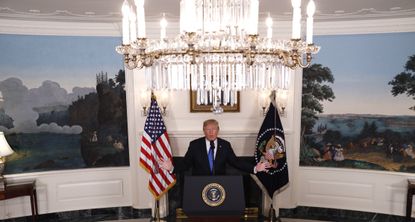The perils of Trump's disastrous Iran decision
Make no mistake: This could be the first step down a slippery slope that leads to war


In a sadly predictable move, President Trump has drastically escalated his attacks on Iran, criticizing them on Friday for a laundry list of things, accusing them of not adhering to the "spirit" of the 2015 nuclear deal, and taking umbrage that Iran continues to be a regional power that won't take U.S. dictation. But most importantly, Trump not only announced that he is decertifying the nuclear deal (which eased sanctions on Iran in exchange for Tehran effectively abandoning its pursuit of nuclear weapons), but also branded the Islamic Revolutionary Guard Corps — a military branch of the Iranian government — a terrorist organization, and levied specific sanctions on them.
In tone and substance, Trump's speech was still more restrained than the warmonger caucus would have liked. He didn't unilaterally breach the deal, as neocons had been pushing him to. Still, it is a thumb in the eye of Iran — especially the IRGC designation — and could easily lead to an escalating tit-for-tat, just like the president's constant stupid blustering has done with North Korea.
To wit:
Subscribe to The Week
Escape your echo chamber. Get the facts behind the news, plus analysis from multiple perspectives.

Sign up for The Week's Free Newsletters
From our morning news briefing to a weekly Good News Newsletter, get the best of The Week delivered directly to your inbox.
From our morning news briefing to a weekly Good News Newsletter, get the best of The Week delivered directly to your inbox.
"This is reckless beyond the extreme," said Barbara Slavin, an Iran expert at the Atlantic Council. "The reason being is that to designate the armed forces of another country as terrorists is to invite retaliation. Would the designation mean that U.S. drone attacks on IRGC personnel are fair game? If so, expect to see Iranian proxies start killing U.S. military personnel again in Iraq or in Afghanistan or Syria." [BuzzFeed News]
Now, the decertification itself does not automatically change anything. Instead, Congress now gets 60 days to decide if it wants to re-impose sanctions, under an expedited process immune to a filibuster, or change the terms of the deal with a new bill. And so, perhaps the most important question now is whether Democrats — especially in the Senate — will stand up for President Obama's most important foreign policy accomplishment — and try to prevent war with Iran.
So far, it doesn't look good.
Republican Sens. Bob Corker (Tenn.) and Tom Cotton (Ark.) are already ready to serve Trump with a new bill — which could be filibustered — that would unilaterally change the terms of the Iran deal, by removing its sunset provisions and increasing limitations on advanced centrifuges. (One key point of the agreement was that if Iran showed good faith, it could eventually get out from under some of the requirements by 2025, and be treated more like any other nation — though as Ali Vaez explains, many requirements last until 2030 or 2045, and stringent inspections by the International Atomic Energy Agency will continue indefinitely.)
Because Iran is abiding by the agreement, the warmonger caucus wants to add these new conditions that Tehran never agreed to, so it might violate those instead. It is, as Daniel Larison argues, "a blatant show of bad faith from our side."
It's important to understand what conservative and neoliberal hawks alike seem to be after here: If they bait the Iranians into breaching the agreement first, the warmonger caucus will be able to start a cycle of escalation that ends in war, all while being able to claim that we didn't start it.
This would obviously be disastrous.
Remember that despite Trump's claims that Iran has violated the "spirit" of the deal, impartial observers agree that Tehran is very much keeping up its end of the bargain. Trashing the deal serves no purpose beyond conjuring new and frightening problems where none otherwise existed.
For starters, Trump's bogus claims about Iran raise the possibility that a massive pressure campaign will lead Congress to simply re-impose sanctions, thus destroying the deal immediately. That might also happen if Democrats allow themselves to be steamrolled, and Congress changes the terms of the deal via the Corker-Cotton bill. If America unilaterally changes the terms of the deal, it is quite likely that it will eventually collapse.
If American lawmakers kill the deal, it's still possible that Iran will continue to abide by the terms with the rest of the parties, and the United States will just be badly diplomatically isolated for no reason. However, Iran might also conclude that with the deal in tatters, and with American policy in the hands of a mentally unhinged maniac, its best move is to carry out a crash attempt to develop a nuclear deterrent — raising the possibility of a nuclear arms race in a very unstable part of the world.
Make no mistake: This could be the first step down a slippery slope that leads to war. Imagine the howling from hawks here in the U.S. if Iran restarted its nuclear weapons program. Imagine how President Trump would handle that. It is well within the realm of possibility that he would invade Iran.
This would be catastrophic. The American military is badly overstretched and exhausted after 16 years of continuous warfare across half the globe — and this time there would not be any significant help from Europe. The Iranian military is surely no match for America's, but it is also much more formidable than Iraq's rattletrap forces in 2003, and Iran is much larger physically, with over twice the population. Such an invasion might not be nearly the cakewalk that toppling Saddam Hussein was.
And, of course, it would be a horrific, bloody nightmare within Iran. Even if Iran's conventional forces were defeated, there is an absolute certainty of a long, brutal guerrilla war, causing hundreds of thousands of civilian casualties and costing trillions of dollars. It would almost certainly displace the Iraq invasion as the worst foreign policy decision in the history of the United States.
That is why European parties to the deal (the EU announced on Friday it will stick to it) and a handful of Republicans in Congress have been arguing that the U.S. must stick to the deal so long as Iran is doing so. And so long as Senate Democrats can hold together, they can at least filibuster the Corker-Cotton bill. (If Congress does nothing, the deal would remain.)
Yet Democrats have so far been shockingly cavalier about undermining the deal. There is a wide streak of anti-Iran sentiment within the party — and every single Senate Democrat voted to impose new sanctions in June (only Bernie Sanders and Rand Paul voted against). Here's hoping they can discover some sense in time to stop this catastrophe.
Create an account with the same email registered to your subscription to unlock access.
Sign up for Today's Best Articles in your inbox
A free daily email with the biggest news stories of the day – and the best features from TheWeek.com
Ryan Cooper is a national correspondent at TheWeek.com. His work has appeared in the Washington Monthly, The New Republic, and the Washington Post.
-
 'Voters know Biden and Trump all too well'
'Voters know Biden and Trump all too well'Instant Opinion Opinion, comment and editorials of the day
By Harold Maass, The Week US Published
-
 Is the Gaza war tearing US university campuses apart?
Is the Gaza war tearing US university campuses apart?Today's Big Question Protests at Columbia University, other institutions, pit free speech against student safety
By Joel Mathis, The Week US Published
-
 DOJ settles with Nassar victims for $138M
DOJ settles with Nassar victims for $138MSpeed Read The settlement includes 139 sexual abuse victims of the former USA Gymnastics doctor
By Justin Klawans, The Week US Published
-
 Arizona court reinstates 1864 abortion ban
Arizona court reinstates 1864 abortion banSpeed Read The law makes all abortions illegal in the state except to save the mother's life
By Rafi Schwartz, The Week US Published
-
 Trump, billions richer, is selling Bibles
Trump, billions richer, is selling BiblesSpeed Read The former president is hawking a $60 "God Bless the USA Bible"
By Peter Weber, The Week US Published
-
 The debate about Biden's age and mental fitness
The debate about Biden's age and mental fitnessIn Depth Some critics argue Biden is too old to run again. Does the argument have merit?
By Grayson Quay Published
-
 How would a second Trump presidency affect Britain?
How would a second Trump presidency affect Britain?Today's Big Question Re-election of Republican frontrunner could threaten UK security, warns former head of secret service
By Harriet Marsden, The Week UK Published
-
 'Rwanda plan is less a deterrent and more a bluff'
'Rwanda plan is less a deterrent and more a bluff'Instant Opinion Opinion, comment and editorials of the day
By The Week UK Published
-
 Henry Kissinger dies aged 100: a complicated legacy?
Henry Kissinger dies aged 100: a complicated legacy?Talking Point Top US diplomat and Nobel Peace Prize winner remembered as both foreign policy genius and war criminal
By Harriet Marsden, The Week UK Last updated
-
 Trump’s rhetoric: a shift to 'straight-up Nazi talk'
Trump’s rhetoric: a shift to 'straight-up Nazi talk'Why everyone's talking about Would-be president's sinister language is backed by an incendiary policy agenda, say commentators
By The Week UK Published
-
 More covfefe: is the world ready for a second Donald Trump presidency?
More covfefe: is the world ready for a second Donald Trump presidency?Today's Big Question Republican's re-election would be a 'nightmare' scenario for Europe, Ukraine and the West
By Sorcha Bradley, The Week UK Published